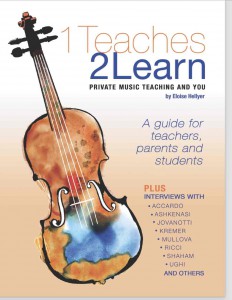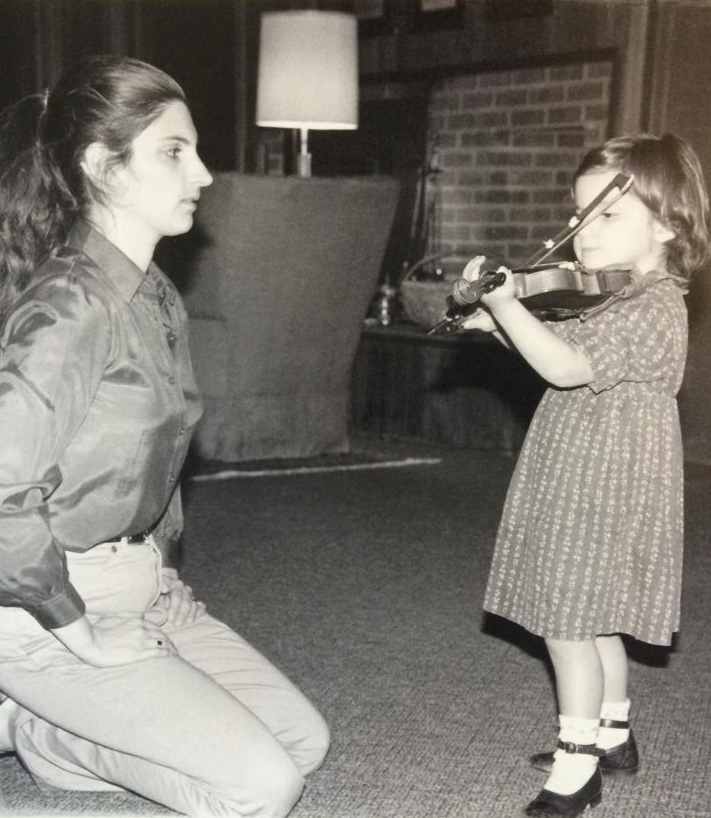Past Perfect
“No problem can be solved from the same level of consciousness that created it.” Albert Einstein
Recently I read an article by a violin teacher talking about perfectionism being dangerous. She believes we have to teach our students to listen to the positive voices in their brains instead of the negative ones that perfectionism seems to imply to her.
On researching the definition of perfectionism, there doesn’t seem to be much consensus. Some think it’s positive, others negative, and still others think it can be both. So we have to define our terms. It seems that perfectionism is just fine when it’s applied to one aspect of our lives: striving to do one thing particularly well. Indeed, how on earth can anyone be a high achiever in music, or anything else for that matter, without a very good dose of “healthy” perfectionism (yes, that’s what it’s called)?
So what’s the difference between healthy perfectionism and, well, the other kind? In my experience, the healthy perfectionist doesn’t take her mistakes personally. i.e., she sees a mistake as something that needs to be corrected, and doesn’t see it as connected to her self-worth, as in this scenario:
- She makes a mistake,
- She figures out what went wrong,
- Maybe she gets a bit irritated, but fixes it and
- Goes on to the next problem. No recriminations, self-judgment, or questioning her self-worth.
For the moment, let’s call the other kind of perfectionism “unhealthy perfectionism.” This is when the student sees the mistake as a judgment on the value of himself as a person, such as in the following scenario:
- Student plays for teacher.
- Student makes a mistake or doesn’t perform as well as he would like.
- Students goes into downward spiral of “I don’t like what I did, I can’t do this, therefore I’m not good, I’m no good, I am a miserable excuse of a student. I’m incapable. I’m a failure. I hate everything I do.”
- Teacher perceives this and tries to encourage the student by pointing out everything that is going right but the student is so caught up in himself, nothing the teacher says makes a difference. You see, the student thinks he knows more than the teacher (just a touch of arrogance here, too?). Or rather, it may make a difference for a little while, but the student will still fall back into this destructive way of thinking with very little provocation. It’s a very damaging ingrained habit.
In the first case, the so-called healthy perfectionism, the student is focused on the problem. In the second, the student is focused on himself.
The teacher who wrote the article says that we have to connect our students to the positive voices in their heads instead of the negative ones. Constantly pointing out the positive in your students’ playing, consoling them, insisting they are doing well when they are convinced they are not, and trying to change the way they think about themselves, in my opinion, is simply feeding into the problem. And in my experience, it doesn’t work—at least not in the long term, as they’re still stuck in the same rut. It’s two sides of the same coin: heads or tails, negative or positive—the coin being the ego. I call this “unhealthy perfectionism” by another name: “wrong use of ego,” i.e., thinking about self, everything being a reflection of their self-worth instead of simply thinking about what self is doing with no further iteration. The ego is running the show instead of the student using his ego to accomplish something.
Referring to the above quote by Einstein, this is exactly what a teacher would be doing in trying to replace a negative way of thinking with a positive one—using the same consciousness that created the problem to solve it. It’s still thinking about self. It doesn’t matter if it’s negative or positive; the focus is on something much less productive and more harmful in the long run. You see, even if you succeed in disconnecting your student from that negative voice in her brain and connecting her to the positive one, it still has the same outcome—it doesn’t take much for a student to relapse into listening to that negative voice.
And here is where we have to change consciousness. We have to give our students a completely new mechanism for dealing with the problems of learning something as difficult as the violin. Instead of teaching a child to listen to a positive voice in his head about himself instead of the negative one, we have to help the student disconnect from those voices so they can learn effectively. Eastern philosophy says that you have to be an empty vessel in order to learn. If that vessel is filled with thoughts of self-loathing or self-aggrandizement, how is that self going to learn anything? How can the teacher fill that empty vessel with knowledge? How can there even be an exchange of energy when one part of the equation is all caught up in himself?
I have had students like this. With one negative thinker in particular, I tried every trick in the book (some like the teacher in question mentioned) and a few I invented. Nothing could get him out of his bad habit of denigrating himself. Every minuscule mistake he made turned into an orgy of self-flagellation. No amount of encouragement or pointing out his numerous accomplishments did any good. I realized later that this just helped him to keep on thinking about himself, which meant that his focus was not where it should have been and, therefore, certainly was not conducive to good practicing or playing.
So I finally took Einstein’s advice. I informed the student that his reaction to his mistakes was just an excuse to think about himself and a terrible waste of time. This shook him up a bit. I asked how much he could accomplish when all caught up in thoughts about himself. That got him thinking. I then asked him what was more important in the long run: what he was doing or how he was feeling about himself. The answer was, of course, what he was doing. And we started making progress.
One day, however, to my dismay I saw him going into that downward spiral yet again, and I asked him: “What are you thinking about—yourself or what you’re doing? Because if it’s the former, I’m stopping the lesson as I can no longer help you.” I have never seen a student do an about-face so fast.
He has improved so much! But on the now rare occasion I see that look come over his face, all I have to do is I ask him what he’s focusing on and the answer is, “Oh yes, I’m thinking about myself—gotta stop that!”
Now this isn’t to say that students don’t need encouragement. Of course they do but for what they do, not what they are, that the two are not connected at least as far as playing the violin is concerned. “My, you played that phrase so sensitively,” is fine as it’s praise for what the student did. “My, what a great talent you are,” can feed into unhealthy perfectionism because it’s about what the student is. We want to raise fine, upstanding future adults and as teachers we want to contribute to this. But the best thing we can do for our students is to help them to think critically about what they do, and to learn to not extend it to what it means about them as human beings every time they make a mistake. In other words, a Very Important Principle all of us should learn at some point and pass on to our students:
YOU ARE NOT YOUR MISTAKE.
In fact, mistakes can be helpful in pointing out a problem we may not have realized existed.
Yes, a change in consciousness from being the center of one’s own universe, to being an important contributor to everyone else’s universe, which I think is one of the aims of music, cannot be done if all you think about is yourself, your self-worth, your self-anything.
So, ask your negatively thinking students what gives them energy? What gives energy to help them accomplish what they want to achieve? What spurs them to action: the desire to correct a mistake or a negative self-image? Does thinking about what they are (negatively or positively) help them resolve a problem? Or does focusing on the problem itself and how to fix it, work better? How much do they accomplish when they are used by their egos instead of using their egos to improve? There’s a very big difference between “I don’t like what I did which means I’m no good and never will be,” and “I didn’t do that so well and I know I can do it better—so let’s see…”
We should be teaching our students that self-criticizing, either positively or negatively, takes away energy from what they’re trying to achieve. They need to distinguish between whether what they do is good or not, instead of whether what and who they are is good or not, at least when practicing, playing, performing and taking lessons.
And, by the way, I don’t call it perfectionism—I call it being fussy about what I do. That definition works for me.
Post author: Eloise Hellyer
Share this:
Buy it on www.sharmusic.com - eBook format, avaliable worldwide, paperback in North America
COPYRIGHT
ABOUT
A music teacher’s thoughts and observations on the teaching and the study of a musical instrument, hoping to be of help to parents, students and teachers.
PHOTO
AWARDED TOP 25 VIOLIN BLOG
CATEGORIES
TAGS
ARCHIVES
-
Agosto 2022
Agosto 2023
Agosto 2024
April 2015
April 2016
April 2017
April 2019
April 2020
Aprile 2022
Aprile 2023
Aprile 2024
August 2014
August 2015
August 2016
August 2017
August 2018
August 2019
August 2021
December 2014
December 2015
December 2016
December 2017
December 2018
December 2019
December 2020
Dicembre 2022
Dicembre 2023
Dicembre 2024
Febbraio 2022
Febbraio 2023
Febbraio 2024
February 2015
February 2016
February 2018
February 2019
February 2020
February 2021
Gennaio 2022
Gennaio 2023
Gennaio 2024
Giugno 2022
Giugno 2022
Giugno 2023
Giugno 2024
January 2015
January 2016
January 2017
January 2018
January 2019
January 2020
July 2015
July 2017
July 2019
June 2016
June 2017
June 2018
June 2019
June 2020
June 2021
Luglio 2022
Luglio 2023
Luglio 2024
Maggio 2022
Maggio 2023
Maggio 2024
March 2015
March 2016
March 2017
March 2018
March 2019
March 2020
March 2021
Marzo 2022
Marzo 2023
Marzo 2024
May 2015
May 2016
May 2018
May 2019
May 2020
November 2014
November 2015
November 2016
November 2017
November 2018
November 2019
November 2021
Novembre 2022
Novembre 2023
Novembre 2024
October 2014
October 2015
October 2017
October 2018
October 2019
October 2020
October 2021
Ottobre 2022
Ottobre 2023
Ottobre 2024
September 2014
September 2015
September 2016
September 2018
September 2019
September 2020
September 2021
Settembre 2022
Settembre 2023
Settembre 2024
RECENT POSTS
Terry G and Me, or Terry Gilliam on Where (or What) Practicing the Piano Will Get You…
The Teaching We Don’t Do Is More Important Than We Think
Overwhelmingness or What Teaching and Motherhood* Have in Common
Cellphone Serenity
How to Build Your Reputation – the Kind You Want
Desperate Times, Desperate Measures. Or How to Deal With Your Strong-Willed Stubborn Student and Survive
“Why Does My Teacher Get So Frustrated?” Letter to a Perplexed Student
Mount Rush-no-more….And How to Get There
Realizzato con VelociBuilder - Another Project By: Marketing:Start! - Privacy Policy




